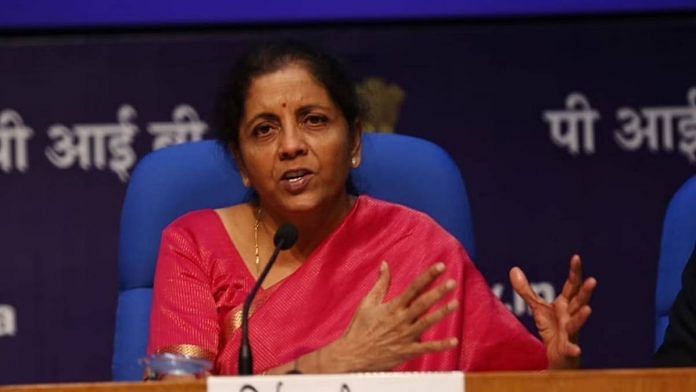New Delhi: Finance Minister Nirmala Sitharaman Tuesday raised the risk of India being compelled to undo some of the progress it has made towards climate commitments and revert to using coal-based power in light of skyrocketing prices of international gas.
Speaking on the topic ‘India’s Economic Prospects and Role in the World Economy’ at The Brookings Institution in Washington, US, the Finance Minister highlighted that energy availability and prices, and fertiliser prices were two prominent risks facing the Indian economy, adding that these were extraneous to the Indian economy in their origin.
The Finance Minister is on an official visit to the US, during which she will be attending the annual meetings of the International Monetary Fund (IMF) and the World Bank, the meetings of the G20 Finance Ministers, and the Central Bank Governor (FMCBG).
“At a time when all the economies globally are trying to attend to the climate-related risks and had committed themselves during the various Conference of the Parties (COP)-21, 22 and so on, as recently as in Scotland, you are looking at a transitional phase where you wanted natural gas to come through,” Sitharaman said during a fireside chat with Eswar Prasad, senior fellow at Brookings.
She added: “India has proved that it has kept up the nationally-determined commitments, as was given in Paris, and it will continue to do that and the Paris commitments were fulfilled purely and entirely with our own resources. But at this stage, if natural gas is going to be beyond our means, obviously you are looking at reverting to coal to an extent because you need the base level of electricity to be generated and that just cannot be done through solar or wind energy.”
According to data from the Petroleum Planning & Analysis Cell of the Ministry of Petroleum and Natural Gas, in 2011, India met about 72 per cent of its demand for natural gas through domestic production. The balance 28 per cent was imported.
By 2021, imports made up nearly 50 per cent of India’s natural gas consumption, thereby increasing India’s exposure to external risks such as the ongoing war in Ukraine.
The price of natural gas in India has spiked in recent years, with the rise in 2022 being attributed to the supply shortages being created due to the crisis involving Ukraine and Russia.
“So, you’ve given your commitment, you have proved that you can fulfil the commitments but now you are at a risk of having to go back to thermal power,” Sitharaman said. “And this is not a dilemma just for India, it’s a dilemma for very many countries. So that is one major challenge for us in the immediate and medium term as well.”
Also read: Climate change could jeopardise energy security if renewables not doubled by 2030, says UN body
Fertiliser another risk
Speaking about other risks, the Finance Minister highlighted the fiscal cost being borne by the government due to high fertiliser prices.
“India is a country that successfully produces almost all that we consume and are in a position to export, whether it is milk, vegetables, fruits, coarse grains,” said Sitharaman. “All these are abundantly produced in India. But we do need fertilisers.”
She added: “Our soil is fairly fatigued out in some parts. Fertiliser is a great risk. Last year, we had to give 10x the price to import and obviously Indian farmers are still not really large farmers. Many of them have just barely enough land with which they produce. They need fertilisers at an affordable price. I can’t raise the input cost by saying I am importing it at this price therefore it is yours to take and take the burden as well.”
So, in order to spare the farmer the burden of rising fertiliser prices, the government bore the price increase, leaving the price paid by the farmers unchanged. What this has meant is that the government’s fertiliser subsidy bill in financial year 2022-23 will likely balloon to over Rs 2.15 lakh crore from the Rs 1.62 lakh crore in the previous year.
Growth-oriented budget
Speaking on other issues, the Finance Minister said that India’s Budget 2023 will have to balance how to manage growth in a high-inflation situation.
“Specifics (of the next budget) may be difficult at this stage because it’s a bit too early,” Sitharaman explained. “But broadly, the growth priorities will be kept absolutely on the top even as I speak about the concerns that inflation brings before me. So, inflation concerns will have to be addressed. But then how would you manage growth would be the natural question.”
She added: “But that’s the point of being sure how you’re going to be able to balance the two and be sure that the momentum that the Indian economy has got coming out of the pandemic and the momentum with which it will grow even the next year, even as per the many many multilateral institutions which are observing India cannot be weakened.”
UPI in other countries
Responding to a query from the crowd, the Finance Minister said that Singapore and UAE have expressed interest in India’s payments network and are in talks to accept the RuPay payment system in their countries.
“Not just that, the UPI (Unified Payments Interface), the BHIM app, and NPCI (the National Payments Corporation of India) are all now being worked in such a way that their systems in their respective country, however robust or otherwise, can talk to our system and the inter-operability itself will give strength for Indians expertise in those countries,” she added.
(Edited by Poulomi Banerjee)
Also read: 1% of global population caused 23% of growth in carbon emissions from 1990-2019, study says



